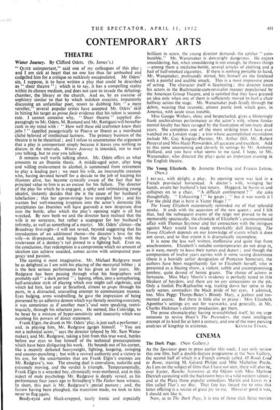The Young Elizabeth. By Jennette Dowling and Francis Letton. (New.)
I RECALL, with delight, a play. Its opening scene was laid in a French provincial homestead. A doctor's wife, wringing her hands, awaits her husband's late return. Haggard, he bursts in and collapses on to a chair. "A difficult confinement ? " she asks thoughtfully. " Exhausting ! " he gasps ; " but it was worth it ! For the child that is born is Victor Hugo ! "
The Young Elizabeth occasionally reminded me of that splendid stroke. It ends with the accession of the new queen ; and I felt that, had the subsequent events of the reign not proved to be so memorably spectacular, the chronicle of Elizabeth's unconsummated affair with Thomas Seymour and her connection with the intrigues against Mary would have made remarkably dull listening. The Young Elizabeth depends on our knowledge of events which it does not cover, and to that extent it is dramatically incomplete.
It is none the less well written, inoffensive and quite free from anachronisms. Elizabeth's notable contemporaries do not drop in, as it were, merely to leave their names and depart ; and though the compression of twelve years carries with it some vexing distortions (there is a horridly unfair denigration of Protector Somerset), the authors have been magnificently fair to Elizabeth herself, who is presented as a blazing shrew, a violent, subtle and uncompromising tomboy, quite devoid of heroic graces. The choice of actress is fortunate. Miss Mary Morris's stridency is perfectly tuned to this bleakest of hoydens, and there are no coy concessions to the pit. Only a foolish Pre-Raphaelite wig, trailing down her spine in the early scenes, contradicts the black pride of her eyes. I admired, too, Miss Peggy Thorpe-Bates's Bloody Mary, a jealous and tor- mented ascetic. But there is little else to praise : Miss Elizabeth Agombar's settings cry out for waxworks, and generally, in Mr. Charles Hickman's clammy production, get them.
The prose chronicle-play having re-established itself, let me urge someone to revive Ibsen's The Pretenders, the most intelligent attempt of its kind for at least a century, and one of the most piercing


































 Previous page
Previous page